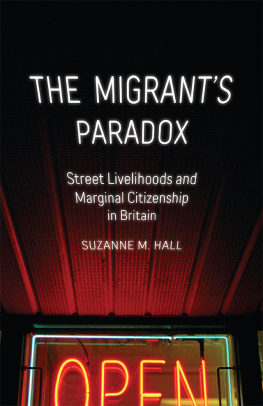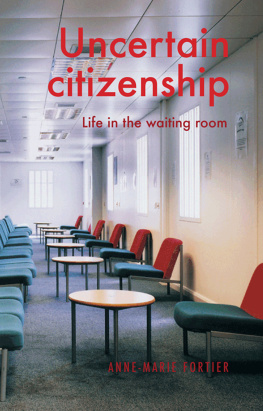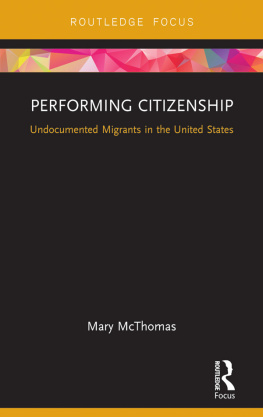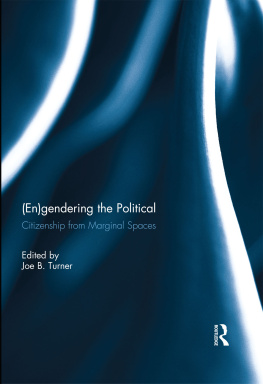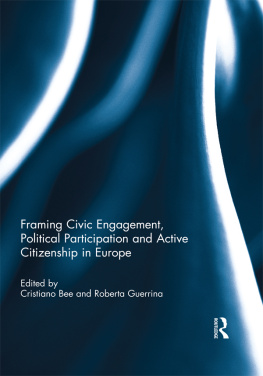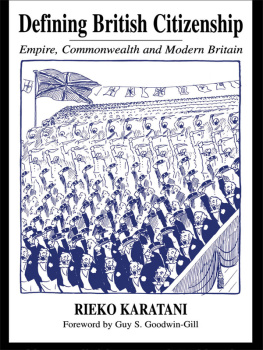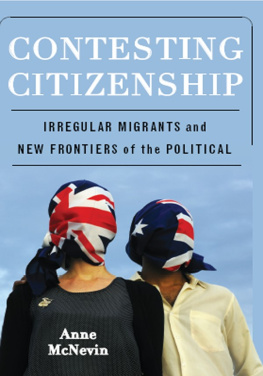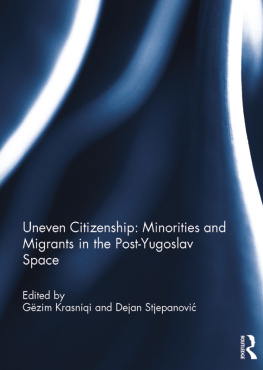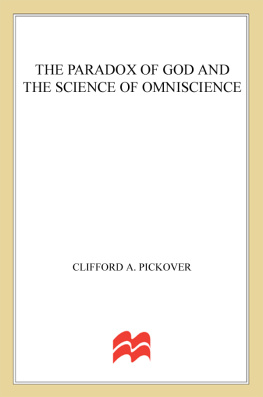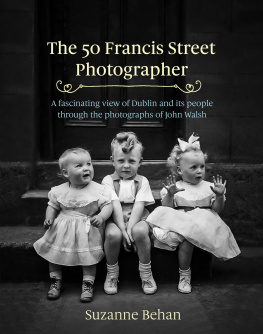Suzanne M. Hall - The Migrants Paradox: Street Livelihoods and Marginal Citizenship in Britain
Here you can read online Suzanne M. Hall - The Migrants Paradox: Street Livelihoods and Marginal Citizenship in Britain full text of the book (entire story) in english for free. Download pdf and epub, get meaning, cover and reviews about this ebook. publisher: University of Minnesota Press, genre: Politics. Description of the work, (preface) as well as reviews are available. Best literature library LitArk.com created for fans of good reading and offers a wide selection of genres:
Romance novel
Science fiction
Adventure
Detective
Science
History
Home and family
Prose
Art
Politics
Computer
Non-fiction
Religion
Business
Children
Humor
Choose a favorite category and find really read worthwhile books. Enjoy immersion in the world of imagination, feel the emotions of the characters or learn something new for yourself, make an fascinating discovery.
- Book:The Migrants Paradox: Street Livelihoods and Marginal Citizenship in Britain
- Author:
- Publisher:University of Minnesota Press
- Genre:
- Rating:4 / 5
- Favourites:Add to favourites
- Your mark:
- 80
- 1
- 2
- 3
- 4
- 5
The Migrants Paradox: Street Livelihoods and Marginal Citizenship in Britain: summary, description and annotation
We offer to read an annotation, description, summary or preface (depends on what the author of the book "The Migrants Paradox: Street Livelihoods and Marginal Citizenship in Britain" wrote himself). If you haven't found the necessary information about the book — write in the comments, we will try to find it.
Suzanne M. Hall: author's other books
Who wrote The Migrants Paradox: Street Livelihoods and Marginal Citizenship in Britain? Find out the surname, the name of the author of the book and a list of all author's works by series.
The Migrants Paradox: Street Livelihoods and Marginal Citizenship in Britain — read online for free the complete book (whole text) full work
Below is the text of the book, divided by pages. System saving the place of the last page read, allows you to conveniently read the book "The Migrants Paradox: Street Livelihoods and Marginal Citizenship in Britain" online for free, without having to search again every time where you left off. Put a bookmark, and you can go to the page where you finished reading at any time.
Font size:
Interval:
Bookmark:
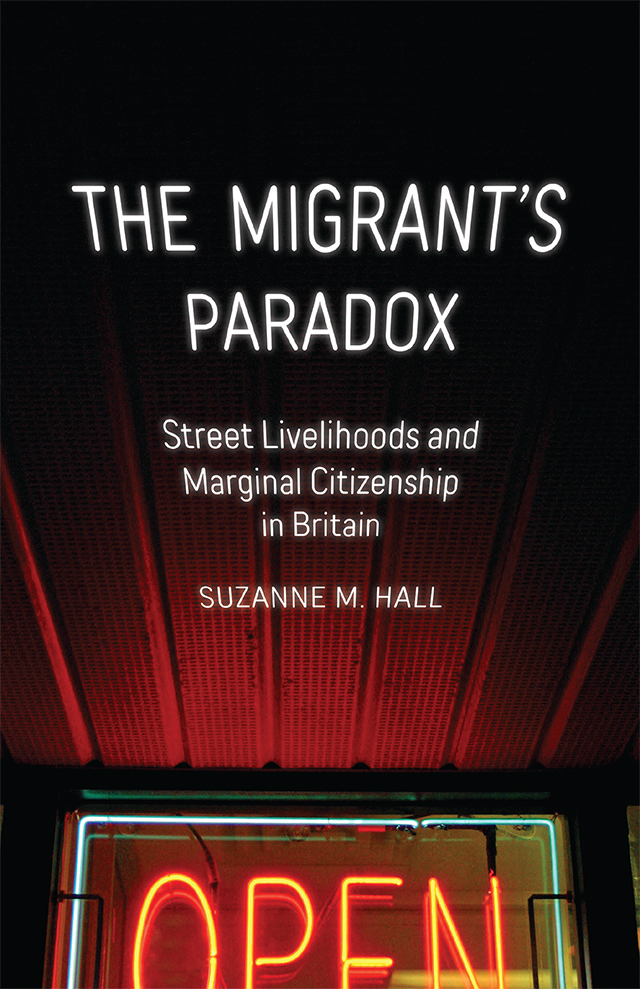
Suzanne M. Hall
Globalization and Community, Volume 31

University of Minnesota Press
Minneapolis
London
The University of Minnesota Press gratefully acknowledges financial support for the open-access edition of this title from the UK Research and Innovation Body, in connection with an ESRC grant (ES/L009560/1).
Portions of chapters 2 and 3 were previously published as Migrant Margins: The Streetlife of Discrimination, The Sociological Review 65, no. 5 (2018): 96883; copyright 2018 by Suzanne M. Hall. Portions of chapter 4 were previously published as Migrant Urbanisms: Ordinary Cities and Everyday Resistance, Sociology 49, no. 5 (2015): 85369.
Copyright 2021 by Suzanne M. Hall
The Migrants Paradox: Street Livelihoods and Marginal Citizenship in Britain is licensed under a Creative Commons Attribution 4.0 International License (CC BY 4.0): https://creativecommons.org/licenses/by/4.0/.
Published by the University of Minnesota Press
111 Third Avenue South, Suite 290
Minneapolis, MN 55401-2520
http://www.upress.umn.edu
ISBN 978-1-5179-1049-5 (hc)
ISBN 978-1-5179-1050-1 (pb)
Library of Congress ebook record available at https://lccn.loc.gov/2020053653.
The University of Minnesota is an equal-opportunity educator and employer.
To John, Sam, and Gus with love and respect
You are not lost because you are multiple.
douard Glissant, One World in Relation, 2009
If you believe you are a citizen of the world then you are a citizen of nowhere.... You dont understand what the very word citizenship means.
Theresa May, Conservative Party Conference, 2016
Every time you reach the edge, the edge move ahead of you like a shadow until the whole world is a ghetto, and you wait.
Marlon James, A Brief History of Seven Killings
A conjuncture is a period during which the different social, political, economic and ideological contradictions that are at work in society come together to give it a specific and distinctive shape.... As I see it, history moves from one conjuncture to another rather than being an evolutionary flow. And what drives it forward is usually a crisis, when the contradictions that are always at play in any historical moment are condensed.
Stuart Hall and Doreen Massey, Interpreting the Crisis, Soundings
A migrant is a person required and refuted by Western sovereignty. To inhabit this impossible dualism requires living with a steadfastly unstable status, readily questioned at the onset of national elections or economic crises, while tenuously embraced under the banners of celebratory multiculturalism. The Migrants Paradox is located in the brutal contradictions of border-preserving politics and border-expanding economics that increasingly constrict the life and space available to the migrant. This book is about the street life of the migrants paradox and what it means to make life and livelihood within a citizenship that is always called into question. It unfolds from streets located in the far-flung parts of deindustrialized UK cities, where jobs are hard to come by and the impacts of historic state underinvestment are deeply felt. Within these cracks of capitalism, I explore the diverse formations of street economies and how they reflect the limits and possibilities of migrant city-making. To tell this story of the migrants paradox through the commonplace banality of the street is to write with two footings. One rests on the connection of state and street and how a political economy of displacement residualizes humanity. Here it is crucial to show how the asymmetries of global migration intersect with the ongoing ferocities of urban marginalization. This conjuncture allows us to understand the UK migration system as part of a larger condition of human displacement that not only unfolds across global, national, and urban space but also corresponds with related forms of dislocation and their colonial antecedents. The cumulative effect is to dislodge human prospect and citizenship by substituting it with precarity and denizenship. The other footing rests on writing the street as world, engaging with the experiences of encounter and exchange among shop proprietors on the urban margins of Birmingham, Bristol, Leicester, London, and Manchester. These proprietors talk about the hard work of navigating multiple border logics, and their claims to space contest the all-too-narrow questions of What is a border? and Who is a migrant?
The connection between state and street makes starkly visible multiple strands of displacement: how citizenship is eroded by the punitive legality of the border regime, how secure work is supplanted by casualized employment, and how affordable space is eroded by state-sanctioned regeneration. Oren Yiftachel writes about displaceability as a systemic condition through which marginalizing power is exerted through policy and legal systems, implicating the centrality of the state in orchestrated displacements. Within this constitutive margin the state maintains the migrant as a prefigurative racialized outsider, even once citizenship is legally conferred.
Writing the street as world requires tracing the proprietors varied journeys to the street, surfacing the connections between global displacements and urban emplacements and between histories of colonialism and current coloniality. Across these streets, proprietors have traveled from Afghanistan, Bangladesh, Cameroon, Canada, China, Cyprus and Northern Cyprus, Eritrea, Ghana, India, Iran, Iraq, Ireland, Italy, Ivory Coast, Jamaica, Kashmir, Kenya, Kurdistan, Lithuania, Malawi, Malaysia, Nepal, The Netherlands, Nigeria, Pakistan, Palestine, Poland, Sierra Leone, Somalia, Sri Lanka, Sudan, Tanzania, Thailand, Trinidad, Turkey, Uganda, the UK, Vietnam, Yemen, Zambia, Zimbabwe. I explore how this spectrum of diverse individuals becomes positioned in terms of work prospects and urban locality, and how they reposition themselves through practices of claiming space. Many proprietors narrate their multiple border crossings through acquiring a cosmopolitan repertoire of global edgeslearning more languages, gaining more accreditations, developing additional skillsall of which perversely grow alongside their experiences of redundancy. I therefore question how race maps onto place, exploring how migrant groups become embedded in the city. The production of race as a primary axis of subordination is instrumentalized through the homogenizing state logics of whiteness and its vocabularies of a nonwhite and minority condition. Yet the street is a multifarious composition that defies these flattening tropes, both in the discrepant racializations of a wide array of migrants and in the varied invocations of blackness and practices of refusal in the everyday life of the street.
A ten-minute walk down any of these streets evokes a capricious configuration of how goods, services, interiors, pavements, labor, care, and contestation are shaped and imagined. Writing the street as world brings into play the wider orderings of centrality and marginality, along with the perpetual spatial and human struggles over the relative meanings of core and edge. From the connection between street and world we learn of a different vocabulary of the migrant, one that Monisha Das Gupta invokes as border-crossing people as a necessarily unruly mode of activating citizenship and repurposing space. This prompts an understanding of human citizenship as deeply immersed in the cultural possibilities of mobility and multiplicity, and with it cultural and political reimaginations of the border. Further, it requires an engagement with the margins as neither a peripheral nor minority condition but as a place from which to push back, refute, and reconfigure.
Next pageFont size:
Interval:
Bookmark:
Similar books «The Migrants Paradox: Street Livelihoods and Marginal Citizenship in Britain»
Look at similar books to The Migrants Paradox: Street Livelihoods and Marginal Citizenship in Britain. We have selected literature similar in name and meaning in the hope of providing readers with more options to find new, interesting, not yet read works.
Discussion, reviews of the book The Migrants Paradox: Street Livelihoods and Marginal Citizenship in Britain and just readers' own opinions. Leave your comments, write what you think about the work, its meaning or the main characters. Specify what exactly you liked and what you didn't like, and why you think so.

